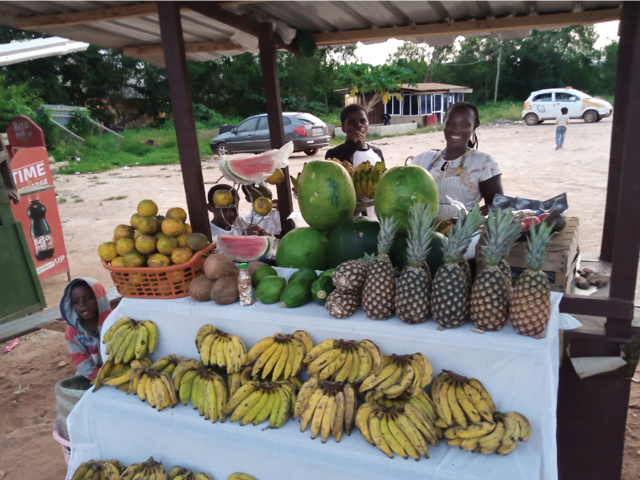Blog
What does ‘promoting sustained, inclusive and sustainable economic growth’ mean for everyday life?
Erica stands under a rudimentary market stall in Accra, Ghana, selling fruits — she has done this every day for 10 years now. Like many women in the Global South, Erica was only able to attend school for a few years before having to leave to work and support her family. Initially she was training to be a seamstress but stopped when she started her own family. After having her children, she wanted to help to provide for them. Without having finished high school, or her seamstress training, she had limited options, thus she decided to enter the informal labour market by setting up her own business selling fruit.

This sort of work does not come with any insurance, and she is not able to access unemployment or sickness benefits in the case of an emergency. Erica explains that ‘If I do not work for a week, my children will not get food to eat’. Despite this, she enjoys her work and the fact that her business allows her to interact with many people. ‘My customers make me happy’, she says. But she has bigger dreams for her children — ‘I hope they would grow to become a nurse, footballer, and pastor’.
Decent work for all
The current structure of the informal economy means that Erica cannot feed her children if she does not work at her stall every single day. Erica’s situation is not unusual. In fact worldwide there are over two billion workers in the informal sector, representing 61.2 per cent of the world’s employed population.
Acknowledging the pervasiveness of informal work, Sustainable Development Goal (SDG) 8 emphasises the need to promote full employment and decent work for all. For Erica this means work that provides sufficiently for her family, allowing her children to gain an education and have greater opportunities in their futures. On a larger scale, achievement of SDG8 signals important pathways to growth, economic development, and social inclusion.
But how are countries like Ghana, that have many informal workers like Erica, doing in creating better jobs? What can policymakers do to encourage the movement of informal workers to more productive jobs?
To answer these questions, it is crucial to have reliable data on production and employment. This was a problematic data gap until 2020, when UNU-WIDER in conjunction with Groningen Growth and Development Centre (GGDC) compiled a new database. The Economic Transformation Database (ETD) has sectoral value-added and employment data for 51 low- and middle-income countries.
Preliminary analysis of the data shows that employment in manufacturing — the sector that is most likely to provide high-productivity jobs in large numbers — is increasing in many countries in sub-Saharan Africa, including Ghana. This suggests that there may well be a future for Erica’s children, if not for her, to move out of poverty and to more lucrative income-earning activities. For policymakers this means that a stronger emphasis on industrialization policies may be warranted.
The developer’s dilemma
But it is not as simple as transitioning everyone from informal jobs to manufacturing. As workers in the Global South move out of agriculture and informal services towards high-value formal services, like manufacturing, a new challenge presents itself — the developer’s dilemma. This refers to the phenomenon that inequality often tends to increase with structural transformation.
So, what can developing countries do to encourage economic development which is inclusive, raising the income of all, especially the poor? Our research shows that public policies that promote access to primary and secondary schooling for all children and invest in technology and public goods in rural areas can make a difference, especially for future generations, such as Erica’s three children. Our book, coming in 2022, The Developer's Dilemma: Structural Transformation, Inequality Dynamics, and Inclusive Growth, provides greater insights through a comparative approach and the experiences of nine developing countries from Asia, Africa, and Latin America.
But what about Erica? She hopes that her fruit-selling business will grow and help her earn more money so she can provide for her family, ‘This work is my future and there’s no other future’. Is Erica continuing to work in the informal sector a bad outcome? While there is evidence to show that higher levels of formality in the labour market support economic development, upon closer inspection we have found that informal labour markets can act as an important space where budding entrepreneurs can build experience and skills. Further, it can provide opportunities for workers to improve their job prospects.
More nuanced view of informality
Through our project on informal work and livelihoods we have collected and analysed data from countries across the Global South. Through this we have found the need to take a much more nuanced view of informality, one that differentiates not only between formal and informal, self-employed and wage employment, but also between upper-tier and lower-tier informality. This distinction helps us to understand where those informal workers are who will have a higher likelihood of moving up the job ladder, and into the formal sector.
By sharing our research findings within policy networks we are able to support better, more informed, labour market policymaking. Through this process we can push back on the old notion of Erica’s labour market choices being either staying at her market and living day-by-day, or transitioning to formal work in a factory. Instead, policymakers would be able to develop informed labour market policy that supports the transition of upper-tier informal workers towards formal work, but also supports people such as Erica who are in low-tier informal work to access upskilling opportunities which enable them to become more productive and achieve decent and remunerative work, even while remaining in the informal sector.
SDG8 sets an ambitious task, to promote sustained, inclusive, and sustainable economic growth, full and productive employment, and decent work for all. When focused on such an immense goal it can be easy to lose sight of what this means for people’s everyday lives. Listening to the stories of people like Erica, their challenges, dreams for the future, and the future for their children, is an important part of a researcher’s job. It keeps us focused on the role of research beyond writing papers, as part of a process which can support better policy design with implications for the lives and livelihoods of people like Erica, and her family.
The views expressed in this piece are those of the author(s), and do not necessarily reflect the views of the Institute or the United Nations University, nor the programme/project donors.
 Join the network
Join the network








